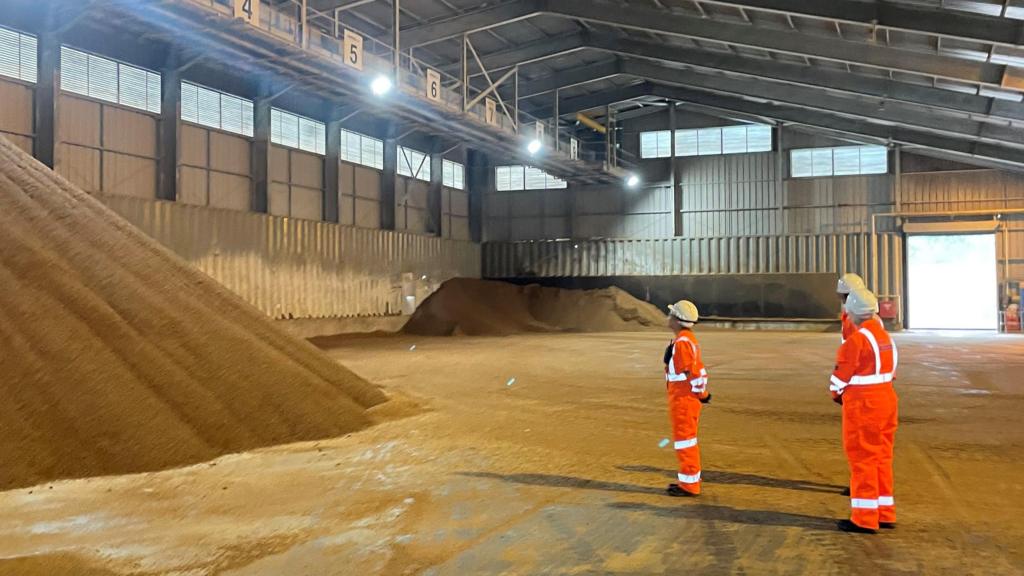Vivergo, a major UK bioethanol producer, has halted production and will commence layoffs for its 160 employees starting Tuesday.
Following weeks of deliberations, the government announced Friday it would not provide financial assistance to the bioethanol sector, which faces increasing competition from US ethanol imports.
Vivergo, owned by Associated British Foods, stated that continued operation without support would result in a “heavily loss-making” business. Consequently, the plant is closing, with all staff departures and site demolition planned by year’s end.
The government justified its decision, citing that a bailout would not provide value for taxpayers or resolve the industry’s long-term challenges.
Alex Snowden, Vivergo’s operations director, described the closure as “heartbreaking.”
“I’m from the local area, I live 10 minutes away from site,” he said. “It’s a huge part of my life.”
“What we’re doing effectively now is emptying the last of our brewery as we’re winding down the plant,” he told the BBC.
The plant, located near the Humber estuary, processes locally grown wheat to distill alcohol for bioethanol, converting the residue into high-protein feed pellets, primarily for dairy cattle.
The operation has experienced fluctuations but is now in good condition, Mr. Snowden noted, which he says makes the closure especially disappointing.
Bioethanol, derived from waste oil or grains, is used as a fuel additive to reduce emissions. It is added to fuels such as E5 and E10 petrol and sustainable aviation fuel.
In May, the UK finalized a trade agreement eliminating 19% tariffs on up to 1.4 billion liters of US-imported ethanol, an amount equivalent to the UK market size.
This concession was part of a broader trade pact designed to ease tariffs threatened by then-President Donald Trump on UK car and steel imports to the US.
Even prior to the trade agreement, the UK sector argued that US imports had an unfair advantage because US ethanol is certified as a waste byproduct in the UK, whereas domestically-produced bioethanol is not.
UK producers have contended that this allows US rivals to undercut them, a situation exacerbated by the removal of tariffs.
Vivergo is one of two bioethanol sites in the UK that have indicated closure without government support.
The BBC reports that the other plant in Redcar, Teesside, owned by German firm Ensus, awaits a government decision on support for its CO2 production, a product vital to industry, food production, and healthcare.
Vivergo also planned to capture CO2 generated during bioethanol production but had not yet commenced the process.
Ben Hackett, Vivergo’s managing director, characterized the government’s decision as a “massive blow to Hull and the Humber.”
He argued that the government had deemed the bioethanol sector expendable and that its decision constituted a “flagrant act of economic self-harm.”
Besides the job losses at Vivergo, the company warned of cascading effects on suppliers and customers.
Paul Temple, a farmer located within 30 miles of Vivergo, has not only supplied wheat to the plant but also purchased feed for his livestock.
“As a result of trade negotiations – making a plant effectively uneconomic… this is really frustrating,” he said.
Louise Holder, director of a local haulage firm, added that the closure would have a “massive” impact on the local economy.
“People [will be] out of work,” she said. “Obviously there’s an impact then on the hospitality industry, because people aren’t going out, because they can’t afford to. It just has a rippling effect on everybody, every business.”
Andrew Symes, the chief executive of OXCCU, a sustainable aviation fuel producer, told the BBC’s Today program that the closure would increase the UK’s reliance on imports for CO2 and ethanol, which he termed “risky.”
“I think that was probably what wasn’t realised when the trade deal was done,” he said.
The government stated that it made the decision “in the national interest” and that the tariff deal with the US had protected “hundreds of thousands of jobs in sectors like auto and aerospace.”
A government spokesperson said it would support the companies through the closure process and continue developing proposals to “ensure the resilience of our CO2 supply in the long-term.”
Charlotte Brumpton-Childs, GMB National Officer, emphasized that the government’s commitment to green policies should extend to supporting green jobs.
“A clean energy industrial strategy means nothing if we cannot protects plants long enough to deliver clean energy jobs here in the UK,” she said.
Warburtons is the current market leader and the deal needs approval from the competition watchdog.
Staff at Newport Pagnell Services celebrate its 65th birthday with a giant Austin Morris cake.
Submissions for offers to purchase the entire site or parts of the Immingham refinery closes later.
Employees and suppliers are warning of a crisis point for the site near Hull amid government talks.
Meld Energy says its plan for a Saltend facility is dependent on Vivergo staying operational.

